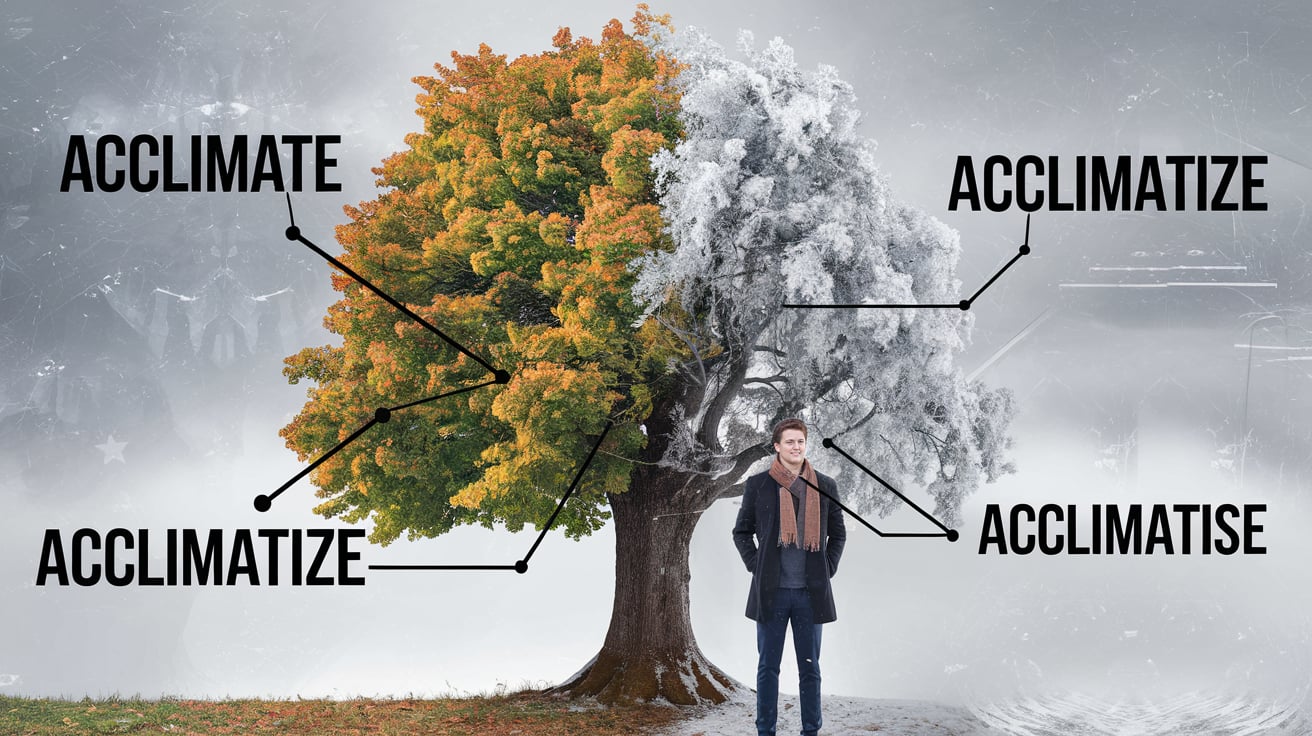Introduction
Have you ever wondered about the difference between acclimate, acclimatize, and acclimatise? These words all relate to adapting to a new climate, environment, or conditions, but their usage depends on region, context, and scientific application.
This guide will break down the differences, regional preferences, and correct usage of each term. Plus, you’ll learn the difference between acclimate, acclimatize, and acclimatise, how the body adjusts to altitude, temperature, and environmental shifts, affecting both people and animals. So, let’s dive in!
Understanding the Core Meaning
Although all three terms refer to adjusting to a new environment, they have distinct nuances:
- Acclimate is more common in American English.
- Acclimatize is preferred in British English and scientific contexts.
- Acclimatise is simply the British spelling variation of “acclimatize.”
Now, let’s explore each term in greater detail.
Read More About This Article: Break or Brake: Which One Should You Use?
Acclimate vs. Acclimatize vs. Acclimatise: Key Differences
Acclimate (American English)
- Definition: To adapt, adjust, or familiarize oneself with new surroundings, conditions, or climate.
- Usage: Primarily used in the United States and in everyday language.
Common Contexts:
- Adjusting to a new job or living situation.
- Getting used to weather changes.
- Adapting to different social or cultural environments.
Examples:
- She had to acclimate to the hot and humid weather in Florida.
- It takes time to acclimate to a new work schedule.
Acclimatize (British & Scientific Usage)
- Definition: To gradually adapt to altitude, temperature, or environmental stress.
- Usage: Preferred in British English, scientific, and medical discussions.
Common Contexts:
- Mountaineering and high-altitude adaptation.
- Scientific research on physiological changes.
- Long-term environmental adjustments.
Examples:
- The team had to acclimatize to the thin air before climbing Everest.
- Scientists study how fish acclimatize to changes in water temperature.
Acclimatise (British Spelling Variant)
- Definition: Identical to “acclimatize” but follows British spelling rules.
- Usage: Common in the UK, Australia, and Commonwealth nations.
Examples:
- Wildlife needs time to acclimatise to changing habitats.
- New employees must acclimatise to the company’s culture.
Usage in Different Contexts
| Term | Primary Usage | Example Contexts |
|---|---|---|
| Acclimate | American English | Moving to a new state, adjusting to a job |
| Acclimatize | British English, Science | High-altitude training, physiological studies |
| Acclimatise | British Spelling | Same as “acclimatize” |
Scientific and Physiological Perspective
How the Body Adapts to Environmental Changes
When humans or animals acclimatize to new conditions, the body undergoes several physiological changes. These adjustments help prevent health risks and enhance performance in extreme environments.
Altitude Acclimatization
At higher altitudes, oxygen levels decrease, leading to altitude sickness. The body adjusts by:
- Increasing red blood cell production.
- Enhancing lung efficiency.
- Boosting oxygen transport in the bloodstream.
Temperature Adaptation
- Cold Adaptation: The body hardens itself by increasing metabolic rates and retaining heat.
- Heat Acclimation: Sweating becomes more efficient, and heart rate lowers to conserve energy.
When to Use Each Term
Use “Acclimate” If:
✅ You’re writing in American English. ✅ The context is casual, workplace-related, or social. ✅ You’re describing a person adjusting to something new.
Example: It took him weeks to acclimate to his new job.
Use “Acclimatize” If:
✅ You’re following British English conventions. ✅ The topic is scientific, medical, or formal. ✅ You’re discussing altitude, temperature, or physiological changes.
Example: The mountaineers need time to acclimatize to the thin air.
Use “Acclimatise” If:
✅ Your audience follows British spelling rules. ✅ You’re writing for a UK-based publication.
Example: He took several days to acclimatise to the humidity.
Common Synonyms and Alternatives
| Synonym | Similar Meaning | Example Usage |
|---|---|---|
| Adapt | General adjustment | She adapted to city life quickly. |
| Adjust | Minor changes | He adjusted his routine for the new job. |
| Accommodate | Making room for change | The body accommodates to heat stress. |
| Familiarize | Becoming familiar | She familiarized herself with the new climate. |
Real-World Examples: Case Studies
Case Study 1: High-Altitude Training for Athletes
- Elite athletes train at high altitudes to improve oxygen efficiency.
- Studies show that runners who acclimatize to thin air perform better in low-altitude races.
Case Study 2: Wildlife and Climate Adaptation
- Polar bears acclimate to changing ice conditions by modifying hunting habits.
- Birds acclimatize to urban environments by adjusting migration patterns.
Conclusion: Which One Should You Use?
- If you write for a U.S. audience, use “acclimate”.
- If your writing is British or scientific, choose “acclimatize”.
- If you need to follow British spelling conventions, use “acclimatise”.
Final Tip:
If in doubt, consider your audience and context before making a choice!
